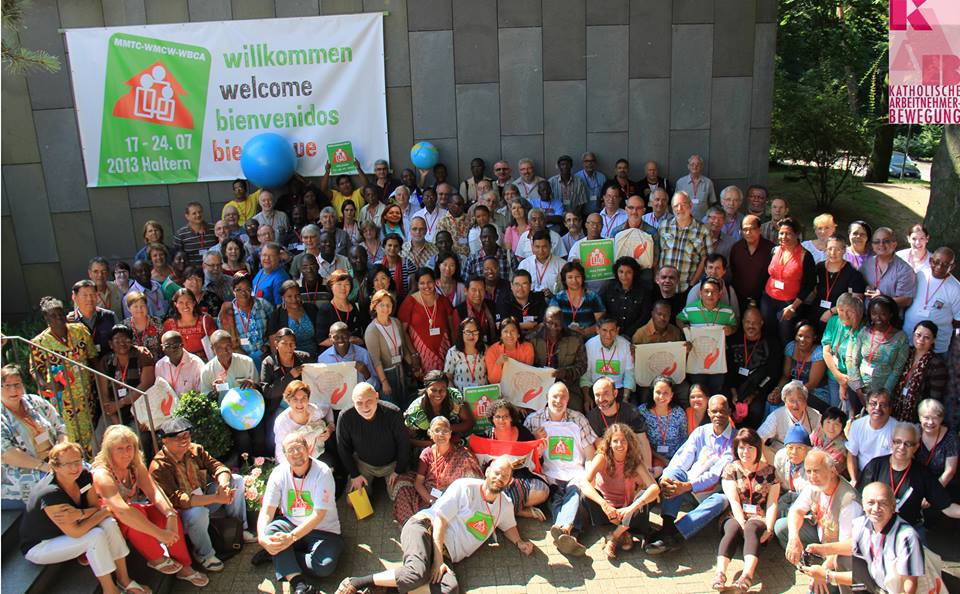
The International Seminar and the General Assembly of the World Movement of Christian Workers (WMCW) were held from the 17th to the 24th of July 2013 at Haltern am See, with the motto“Let’s build a just, fraternal and sustainable society”. These eight days were an occasion for meeting each other and sharing life experiences, were days of intense exchange and debate, driven by the authentic solidarity and fraternity of 163 delegates from 44 national movements of the continents of Africa, America, Asia and Europe, breaking through any language, race or culture barrier. The work of the groups achieved: sharing a global knowledge about the actual workers social rights situation, getting conscious of how they are systematically violated, interpreting this reality with the Gospel and the social teaching of the church and drawing a roadmap for action at international level. These activities have allowed the delegates to present their lives and their movements, discover other realities, analyze common problems and commit to carry out some actions.
The situations illustrated by several delegates witness a reality of suffering for many workers families of every continent. The humanity suffers because the most fundamental rights are not respected. We have found that this economic and financial crisis has caused: The lost of the social rights that were previously won. An increase of unemployment and of precarious work, enslaved migrant workers, housemaids which are not recognized as workers, receiving poor wages and working too long every day, young people who cannot build a future without working opportunities. Millions of workers have no social security and / or an adequate social protection. Especially alarming is the lack of medical care for immigrants in an illegal situation, and the generation of workers that once retired have to live with miserable pensions. In addition to that, an increasing privatization of public services such as healthcare, education, legal assistance is on the way.
We acknowledged that these situations are caused by:AN ECONOMIC MODEL WHICH ANTAGONIZES THE SOCIAL RIGHTS and imposes the commercialization of workers, of social life, and favours the domination of the financial economy over the productive economy. This model absorbs the resources and uses them to the profitability of a few, without social and political control.
A POLICY WITH NO SENSE OF JUSTICE AND FRATERNITY. We note a loss of power of the civil society, a loss of participation for the decisions on the most fundamental issues of our social and family life. The dominant policy has promoted the desire for accumulation of wealth, which threatens not only millions of workers but also the natural resources of our planet. The political action oriented to provide the welfare disappeared and in its place dehumanization and immorality are taking over.
A SOCIAL CULTURE AGAINST FRATERNITY AND SOLIDARITY generated by the individualists and consumerist human relationships. It provokes fear and indifference to the events of life and to the suffering of people; it paralyzes us and make us believe that there are no alternatives. A culture that makes us perceive immorality as normal, that deeply weakened our sense of justice, of the common wealth and of the universal destiny of goods. It is a culture that deeply undermines the practical recognition of social rights.
II. JUDGING: HOW TO EVALUATE THE SOCIAL RIGHTS SITUATIONMark 10, 42-45: "Whoever wants to be first must be last and servant of all." The Gospels and the Social Doctrine of the Church offer clear criteria for living and walking towards a fraternal and solidary society. They claim that the practical recognition of social rights is essential for a society to function.
The dignity of the people and the need of being just with the poorest of our planet requires, especially today, within this context of crisis, that the decisions, political and economic, are oriented towards a greater redistribution of resources to consolidate a just and sustainable human development. The respect for the workers’ rights is the fundamental criterion for organizing the economic life, because the economy must serve the needs of the people, especially the poorest. The current situation of hunger and slavery that this crisis is causing in so many communities of men and women around the world is an outrage to humanity. We ascertained that the neoliberal capitalist system prevents the construction of a just, fraternal and sustainable society.
As Christians we want to make visible our fragility as a church to consistently respond to the needs of our poorer brothers and sisters in our communities. In fact we often become accomplices of an individualist and consumerist lifestyle. We need to be in a process of permanent conversion, and propose new ways of living to our co-workers, show them that there is another way to live, more solidary, more human and more fraternal.
III. ACTING: DEFEND THE WORKERS SOCIAL RIGHTS, AND THE RIGHTS OF ALL PEOPLE, IS A DUTY OF JUSTICEAs movement of Christian workers we want to advance the practical recognition of the workers’ social rights. First of all, defending and extending a new mentality, in our families, in business, in social and political organizations, in the trade unions, in our church communities, fighting those individual, environmental and structural barriers that impede fraternity. We argue that:
- There are sufficient resources for all and therefore wealth must be redistributed more fairlyEach of our movements and every one of us, as a Church, want to actively participate in these tasks, so:
• We are willing to live our social and political commitment to the service of the people, especially to the poorest workers.To do this we must be, as Pope Francis I said: "A poor Church for the poor serving the world. May God help us in this journey, and also to live it with joy."
Assembly of the World Movement of Christian Workers July 24th, 2013 Haltern am See, Germany




